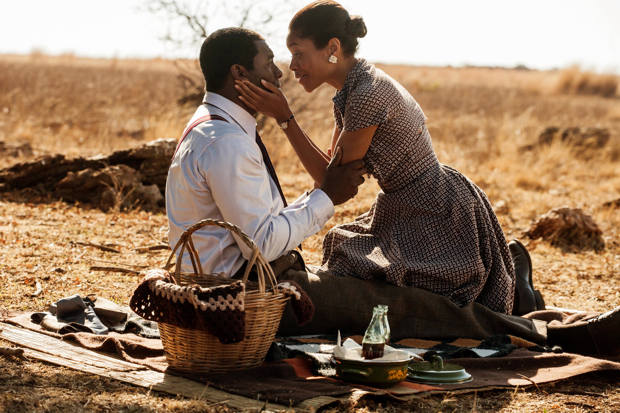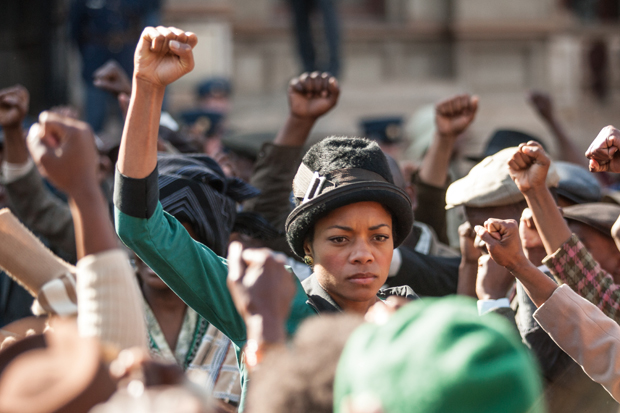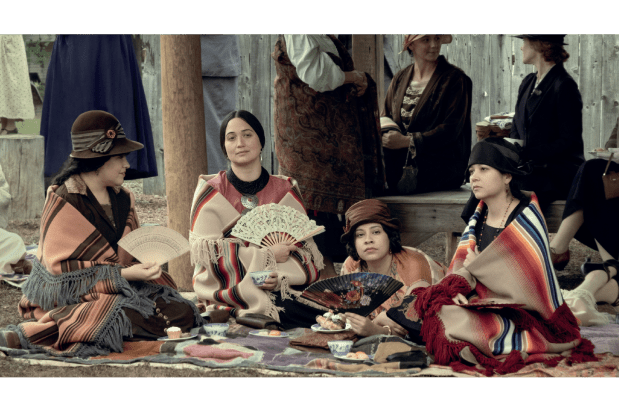The biopic Mandela: The Long Walk to Freedom is a timely tribute, and an earnest and respectful and well-meaning one, but it does seem like a very, very long walk indeed. It’s a slog, a plod, a trudge uphill, and of all the things you may have wished to say to Nelson Mandela, given the opportunity, what you will find yourself saying here is: ‘Put your bloody skates on, man. We have homes to go to, and other fish to fry!’ This is not, I’m assuming, what you thought you’d ever most wish to say to Mandela, given the opportunity, but the fact is: you will never have wanted anyone to put their skates on quite so much in your entire life.
The film is based on his authorised biography, and was made with the endorsement of family, friends and his Foundation, which is fair enough, but it is so sanctifying the result is, astonishingly, given the source material, almost wholly uninteresting. Instead of focusing on one particular period, it tries to cram in the whole life, almost ticking off the events as they happen, so it feels like his Wikipedia entry, filmed. There is no nuance, no complexity, no shading, or any recognition that, to illuminate a life, the facts are one thing, but what we really want to know is the stuff that happened around the edges. It stars Idris Elba, a suitably great and charismatic actor, but even he cannot save this from seeming like a history lesson, as delivered by one of those teachers who can’t seem to breathe life into a subject. Plus, although his performance becomes surer as Mandela ages, the prosthetics become worse — by the end, I was minded of Eddie Murphy when he does his fat women — so I’m not sure where that leaves us, apart from not in a very good place.
Directed by Justin Chadwick (The Other Boleyn Girl, also a pedestrian plod, as I remember), the film opens in the rural surroundings of Mandela’s childhood, then travels to a segregated Johannesburg where, as a young lawyer, he experiences the first stirrings of radicalism, marries his first wife, has some kids, then carries on with another woman, and that’s all within the first 20 minutes. It persists at such a pace — it has to get everything in! — but feels like a trudge, uphill, because none of it is dramatically engaging. It’s tick, tick, tick, now let’s form the ANC, tick, now he’ll glimpse Winnie at a bus stop, tick, and now a fiery speech, tick. It is so busy ticking, it pays absolutely no attention to what makes Mandela tick.
This doesn’t deepen our understanding of Mandela, or give us any sense of what lay behind that kind, open, wise face. His politics are presented in soundbites while the context is provided in lazy montage form, which is always distancing, and although there is the odd attempt to portray him as less saintly and more human — that womanising incident, for example — such attempts always feel half-hearted, an afterthought. The best portion of the film, by far, concerns his relationship with Winnie (Naomie Harris), as there is proper chemistry at work, even proper sexual chemistry, but their diverging views and eventual estrangement are then dealt with in about two minutes flat. Let me tell you something: when Mandela is visited in prison by his and Winnie’s teenage daughter, whom he hasn’t seen since she was a baby, and they touch hands though the glass, I did not cry. Because I felt nothing. I checked, double-checked, triple-checked, turned out my pockets, but, no, nothing.
Elba and Harris can’t surmount the material, particularly Elba with his distracting, Eddie Murphy-fat-woman face — who made the prosthetics? A four-year-old obsessed with Norbit? — and there is not a single pocket of humour, even though I know someone who knows someone who knows someone who once sat two seats away from Mandela at a dinner, and said he had a real twinkle in his eye. (We all know someone like that first someone if you are not yourself that first someone, right?) Anyway, by the end, Mandela has become the gracious grandfatherly figure we so love, espousing the message we so love — peace, forgiveness, reconciliation — even though the film shows us nothing about how he got there. So it’s a long, long walk, and you will be begging him to get his skates on. He can’t now, obviously, but you get my drift.
Got something to add? Join the discussion and comment below.
Get 10 issues for just $10
Subscribe to The Spectator Australia today for the next 10 magazine issues, plus full online access, for just $10.
You might disagree with half of it, but you’ll enjoy reading all of it. Try your first month for free, then just $2 a week for the remainder of your first year.














Comments
Don't miss out
Join the conversation with other Spectator Australia readers. Subscribe to leave a comment.
SUBSCRIBEAlready a subscriber? Log in